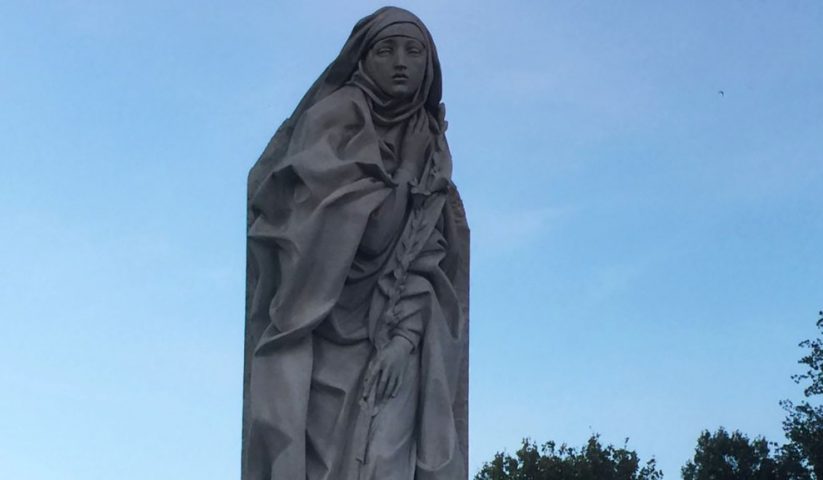A Brave Priest’s Powerful Response to Gay Clergy: “Nobody Forced You to Become a Priest”
April 30, 2019CNA: Cardinal Müller, To Renew the Church We Must Be Guided by Her Faith, Morals
April 30, 2019
By Kathryn Jean Lopez, National Review, April 29, 2019
 I love Saint Catherine of Siena and I love reading through her writings. For years, my copy of The Classics of Western Spirituality translation of her Dialogue was a constant companion. And more recently, there’s a four-volume set of her letters that I invested in over the course of a few recent years, and now frequently have a volume in my purse for dipping into during any moments I can steal with her. She’s so Christocentric and the love that flows from that jumps off the pages with an urgency for, as she might put it, holy boldness. The translator and editor of that edition of The Dialogue and that collection, along with some other books on Catherine is a Dominican sister, Sister Suzanne Noffke, O.P. In honor of Saint Catherine’s memorial day today, a few thoughts from her below via an email interview might be an entry into getting to know this holy woman of history more.
I love Saint Catherine of Siena and I love reading through her writings. For years, my copy of The Classics of Western Spirituality translation of her Dialogue was a constant companion. And more recently, there’s a four-volume set of her letters that I invested in over the course of a few recent years, and now frequently have a volume in my purse for dipping into during any moments I can steal with her. She’s so Christocentric and the love that flows from that jumps off the pages with an urgency for, as she might put it, holy boldness. The translator and editor of that edition of The Dialogue and that collection, along with some other books on Catherine is a Dominican sister, Sister Suzanne Noffke, O.P. In honor of Saint Catherine’s memorial day today, a few thoughts from her below via an email interview might be an entry into getting to know this holy woman of history more.
Kathryn Jean Lopez: How do you come to become such an expert in the work of Saint Catherine of Siena?
Sr. Suzanne Noffke, O.P.: It began with my translation of Catherine’s Dialogue, and simply expanded from there….
Lopez: Do you feel like you know her? What insights have you come to want to share about her? (I often think you must know her better than anyone alive! Do you feel that way?)
Sr. Noffke: There are a few others who know her well, either from their research and writing or out of simple attraction to her.
Lopez: What made her tick? People often seem to think of her as someone who spoke out to popes and bishops, but what gave her courage?
Sr. Noffke: Her courage, I think, came both from her personality and from her deep conviction.
Lopez: Was she speaking from a place of true holiness? How is holiness of her kind possible in the world today? What can we learn from Saint Catherine about holiness?
Sr. Noffke: Her holiness is rooted not in her “unusual” experiences but in her simple commitment to discerning and following God’s will – a model that never goes out of style.
Lopez: What is the blazing charity she always seemed to talk about in her letters?
Sr. Noffke: God’s love – in God and within us – for which one of her favored images is fire.
Lopez: And what is the holy boldness she talks about?
Sr. Noffke: Courage to be “all that we were meant to be.”
Lopez: Is there something about Saint Catherine that would surprise people to learn? That perhaps surprised you along the way?
Sr. Noffke: Her “ordinariness.”
Lopez: Why did God the Father talk to her as He did in The Dialogue? Should her experience encourage us to listen more for His voice?
Sr. Noffke: Catherine seems to have experienced prayer as an exchange between herself and God; so it’s not surprising that she chose that exchange as the vehicle for her writing.
Lopez: Is there a most important message as far as you’re concerned in The Dialogue? In her letters and prayers?
Sr. Noffke: The centrality of love of/for God, expressed in love for one’s neighbors.
Lopez: People must ask: What would she be saying about the world today? What would she be saying to the pope? To bishops? I know that’s a difficult game, so to speak, to play, since she cannot weigh in herself, but are their pointers from her writings we ought to consider?
Sr. Noffke: A huge question! You’ll have to comb my various writings for the answer!
Lopez: Do you have a favorite writing of hers?
Sr. Noffke: Her prayers, because they are so intimately personal.
Lopez: You’ve translated so much of Catherine’s work. Where do you recommend people start?
Sr. Noffke: I suggest beginning with the index to any of her writings and “dipping” into the text from topics which interest you. You’ll find that ideas begin to connect….
Lopez: Has being a Dominican given you a special understanding of Catherine? Has it guided your work in a particular way?
Sr. Noffke: It certainly lends a “color” to my reading of her – She is very Dominican, but also very “universal.”
Lopez: How many years have you been a Dominican? How has it changed? What has been most life-giving about it?
Sr. Noffke: I made my first profession in 1957. I find life both in the spirit (Truth) of the Order and in my particular Racine community.
Lopez: Pope Francis often talks about the Church as Mother. How can St. Catherine help us be that?
Sr. Noffke: I think Francis means the institutional Church as Mother …. Catherine saw herself as “Mama” in relation to her disciples. How each of us enters into that is a very individual matter.
Lopez: What’s your prayer to Saint Catherine for the Church today? For the future of consecrated life?
Sr. Noffke: For the Church – commitment to Truth; for consecrated life – commitment to whatever the mission of Christ in the world asks of us specifically as community.
_______________________________
KATHRYN JEAN LOPEZ is a senior fellow at the National Review Institute and an editor-at-large of National Review. Sign up for her weekly NRI newsletter HERE. @kathrynlopez
Some links that might be of interest:








